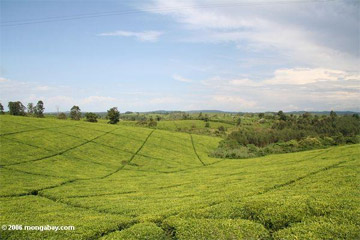Can organic farming provide enough to feed the world?
Can organic farming feed the world?
mongabay.com
July 12, 2007
Contrary to popular belief, organic farming can produce enough to feed the world, reports a new study published in Renewable Agriculture and Food Systems.
Researchers from the University of Michigan found that in developed countries, organic yields were almost equal to those from conventional farms, while organic methods could double or triple food production in developing countries.
“My hope is that we can finally put a nail in the coffin of the idea that you can’t produce enough food through organic agriculture,” said Ivette Perfecto, one of the study’s principal investigators.
The authors found that greater yields could be acieved through the use of cover crops between growing seasons. Such crops help restore the availability of nitrogen and other soil nutrients, hence reducing the need for synthetic fertilizers.
 Tea plantation in Uganda |
“Organic farming is less environmentally harmful yet can potentially produce more than enough food,” explained a news release from the University of Michigan. “This is especially good news for developing countries, where it’s sometimes impossible to deliver food from outside, so farmers must supply their own. Yields in developing countries could increase dramatically by switching to organic farming.”
Increasing crop productivity can also reduce the need to bring more farmland into production. Some critics have said that a shift from industrial agricultural to organic would require large-scale expansion of farmland.
Perfecto said that a shift to organic agriculture would not make the work a hungrier place.
“Corporate interest in agriculture and the way agriculture research has been conducted in land grant institutions, with a lot of influence by the chemical companies and pesticide companies as well as fertilizer companies—all have been playing an important role in convincing the public that you need to have these inputs to produce food,” she said.
CITATION: Catherine Badgley, Jeremy Moghtader, Eileen Quintero, Emily Zakem, M. Jahi Chappell, Katia Avilés-Vázquez, Andrea Samulon and Ivette Perfecto (2007). Organic agriculture and the global food supply. Renewable Agriculture and Food Systems (2007), 22: 86-108 Cambridge University Press doi:10.1017/S1742170507001640